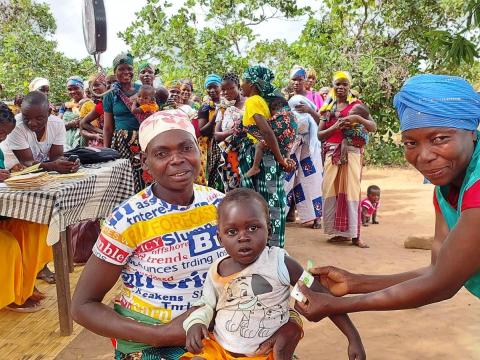Mozambique’s Community Volunteers Lead the Charge Against Child Malnutrition

By Antonio Massipa, Regional Communications and Advocacy Coordinator
In the sun-baked landscapes of Monapo, a district in northern Mozambique, a quiet revolution is taking root—nurtured not by policy mandates or international interventions alone, but by the unwavering resolve of community volunteers. Here, where the shadow of child malnutrition has long loomed large, a locally led initiative is transforming the nutrition landscape for children under five. And at its heart lies one powerful conviction: when communities are empowered, transformation becomes unstoppable.
This remarkable progress is being driven by 480 committed community volunteers, all integral members of 16 local health committees working in close partnership with World Vision. As trusted members of their own communities, they have taken on the critical role of identifying and supporting malnourished children—bringing hope, healing, and the promise of a healthier future.
Their work extends far beyond. Through empathetic family engagement, community cooking demonstration sessions and relentless follow-up, these champions are forging deep-rooted connections with caregivers. They embody World Vision’s community-based model, showing that real change begins with local action, informed by lived experience and nurtured through compassionate service.
The bedrock of their effectiveness lies in the comprehensive capacity building facilitated by World Vision. Each volunteer is trained in contextually relevant nutrition interventions—both food-based and community-driven—anchored in locally available resources. By equipping mothers and caregivers with practical, sustainable knowledge to prepare nutritious meals, the volunteers are not only tackling immediate cases of malnutrition but also embedding long-term behavioural change in households.
The results speak volumes. In just the first half of 2025, a total of 3,248 children under the age of five were screened for malnutrition in Monapo. Of these, 950 were diagnosed with moderate to severe malnutrition, underscoring the breadth of the need. Critically, 217 of the most vulnerable cases were swiftly referred to health facilities for urgent medical care.
The most inspiring metric, however, lies in the number of children restored to health: 683 children have been nutritionally rehabilitated—a 72% success rate that signals not only effective identification but sustained, community-based recovery.
“These are not just numbers. They are children thriving, families empowered, and communities standing stronger than ever,” says Nelson Macajo, Health and Nutrition Technical Coordinator for World Vision Mozambique.
What truly distinguishes these volunteers is the passion and intentionality with which they apply their knowledge. Their daily efforts are not transactional—they are transformational. From sharing simple, nutritious recipes to modelling positive feeding practices, they are building trust and inspiring confidence. They serve not only as nutrition facilitators but as hope bearers, translating technical nutrition guidance into local action that resonates with families’ realities.
The gains made in Monapo exemplify the power of community mobilisation and the resilience that grows when local leaders are equipped with the right tools. By prioritising community-led systems and championing local ownership, World Vision is helping to ensure that the fight against malnutrition is not only winnable but sustainable.
Together with these dedicated volunteers, World Vision is standing shoulder to shoulder with caregivers, creating a movement for change—one household, one child, one village at a time.
Join us in reimagining a future where every Mozambican child is healthy, nourished, and empowered to thrive.